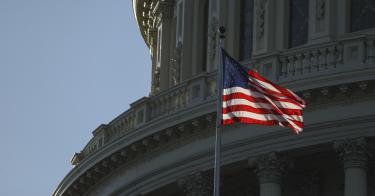It would be illogical to put a Quaker, whose religion forbids violence, in charge of recruitment for the Marines. So why would we ask someone who despises the U.S. economic system in charge of recruiting American diplomats?
Yet, recently, at an Atlantic Council seminar, the deputy director of the Rangel International Affairs Fellowship called capitalism “a common enemy.”
Congress established the Rangel Fellowship in 2002. Like the Pickering Foreign Affairs Fellowship, the program focuses primarily on recruiting targeted minorities. A Rangel fellowship offers a full graduate scholarship, internship at a U.S. embassy, and appointment to the Foreign Service.
Together, Pickering and Rangel Fellows have accounted for around 20% of total Foreign Service recruitment in recent years. In fiscal year 2022, 90 of the 327 officers hired were Fellows.
>>> Republican Education and Dissent
At the Atlantic Council event, moderator Ted Williams asked Bunmi Akinnusotu, Deputy Director of the Rangel Fellowship, why there was push-back when Paul Robeson, Martin Luther King, and other 20th century civil rights leaders attempted to link the U.S. struggle with wider world politics. Here is Akinnusotu’s response:
The reason why folks like Martin Luther King and others were sort of chastised for speaking out against like the Vietnam War is because when you speak truth to power, it hurts. And the crumbling of white supremacy, the crumbling of capitalism, the crumbling of sort of Western imperialism is not a sweet – is not a nice pill to swallow. And God forbid if every single person who is melanated [sic] in the world decided that, wait a minute, we have a common enemy which is capitalism, a common enemy which is, you know, imperialism or racism. God forbid we all decided to get together to do something about that—that would be really devastating for a lot of people.
Meanwhile, President Biden has said that “capitalism has been the world’s greatest force for prosperity and growth.” A 2021 Gallup Poll showed, as it has for over a decade, that 60% of Americans have a “positive image” of capitalism, and 84% think positively of free enterprise. Only 38% have a positive image of socialism – coincidentally, the exact percentage that have a positive image of the federal government.
So where does Akinnusotu’s viewpoint come from? The belief that capitalism is as evil as racism, imperialism, and even slavery is widespread on the Left. Politicians like Bernie Sanders (I-Vt.) and Rep. Alexandria Ocasio-Cortez (D-N.Y.) want to replace capitalism with “democratic socialism.” BLM founders Alicia Garza and Patrisse Cullors have publicly avowed Marxism and anti-capitalism, though they managed to enrich themselves off donated money despite these convictions.
On university campuses, left-leaning professors outnumber conservatives more than 10 to 1. Boston University professor Ibram Kendi wrote that “capitalism is essentially racist; racism is essentially capitalist… and they shall one day die together from unnatural causes.” (That doesn’t deter him from charging $20,000 a pop to speak to universities, schools, and public libraries). One business school professor described the “leftist illiberalism that permeates” [their] university, and the “anti-capitalistic, intolerant campus protest culture with claims of pursuing equality.” A survey of Yale students last year showed that 33% would prefer to live under a socialist system, while only 31% would prefer a capitalist one.
>>> “Conservatives Need Not Apply” Under Biden Administration’s Proposed Hiring Rules
It seems hardly controversial to say that, for the U.S. to be taken seriously on the world stage, we have to stand for something, and people need to know what it is. Exporting contested ideas through our diplomatic programs is a waste of valuable resources and credibility. The State Department and its diplomats should espouse core American values abroad, including capitalism.
By the same token, it is not unreasonable to expect those recruiting the next generation of U.S. diplomats to support capitalism, the economic foundation of our way of life. Americans have seen for over a century that free enterprise generates more wealth than the alternatives. It was obvious to the Cold War generation, observing the Soviet-bloc economies with their cheap concrete apartments, empty stores, and Trabant cars, that communism was not effective at raising standards of living. Anyone who needs convincing today need only visit Havana or Pyongyang.
Akinnusotu runs an expensive, taxpayer-funded program that can account for up to 10% of annual intake into the United States Foreign Service. If she genuinely believes that she and her ideological allies in foreign countries “have a common enemy” in capitalism, then she is unsuited to be recruiting officers who must defend and promote American values abroad, including the world’s greatest free-market economy.
This piece originally appeared in the Daily Caller




